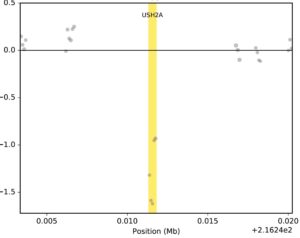Introducing the updated and improved ophthalmology genetic diagnostic panels
Blueprint Genetics has been working towards improving the quality and performance of genetic diagnostic testing for patients with inherited eye disorders. All panels are based on our unique OS-Seq technology that enables high-quality analysis of single nucleotide variants (SNVs), insertions and deletions (indels) and copy number variations (CNVs).
Our technological innovations in sequencing and interpretation enable us to offer high quality diagnostics with competitive pricing and average turn around times of 21-28 days.
The ophthalmology panel improvements include:
CNV analysis for ophthalmology diagnostics
With our in-house developed high resolution CNV analysis tool, our panels offer the most cost-effective and efficient diagnostic tools for Ophthalmology patients available in a CLIA certified and CAP accredited laboratory. The contribution of copy number variants in patients with inherited retina diseases (IRD) is considered more significant than previously thought. For example, in USH2A-related disease, CNVs can contribute to as high as 9-15% of cases (PMID: 25352746, GeneReviews NBK1341). Similar frequencies of CNVs have also been suggested for other major genes associated with IRD.
Fully validated, high-quality genetic diagnostics
Our NGS panels have undergone rigorous analytic validation to demonstrate the quality and performance with various types of mutations and biological samples (link to analytic validation). In our latest update in June 2017, the panels now have coverage for clinically significant deep intronic variants. These improvements include, for example, the recurrent variants CEP290 c.2991+1655A>G and USH2A c.7595-2144A>G, and variants in ABCA4. The update also includes boosting of hard to sequence genes and areas such as the RPGR gene. Read more about the recent update, click here. Further developments and validations are ongoing for these genes and regions. Our panels have also successfully detected patients with MAK gene Alu insertions that are typically missed by standard NGS tests. The improved offering will lead to higher diagnostic yields and offers a unique solution for clinicians working in this field.
Quality diagnostics for inherited retinal diseases (IRD)

Our most popular ophthalmology panel is the Retinal Dystrophy Panel, covering 181 genes associated with IRD. All cases analyzed and reported by Blueprint Genetics are evaluated by a PhD Geneticist in addition to an experienced ophthalmologist who specializes in IRD. This dual review approach not only adds to the quality of Blueprint Genetics clinical statements, it also provides clinical expertise and perspective to our reports.
Analysis of hundreds of patients with the Blueprint Genetics Retinal Dystrophy Panel (a single test approach) revealed a diagnosis or very likely diagnosis (ACMG variant classification guidelines) in >70% of patients which represents the same level of diagnostic yield identified in research projects applying various technologies from Sanger sequencing to Whole Genome Sequencing (WGS) (ref: http://www.aaojournal.org/article/S0161-6420(17)30460-8/addons).
For those customers who prefer a tiered approach, we offer customization in which a subset of genes is initially analyzed. If the initial subset is negative, Blueprint Genetics automatically reflexing to the full 181 gene panel.
> Read more about the Retinal Dystrophy Panel
Collaboration with clinicians and academic institutes
We are collaborating with the Foundation Fighting Blindness to support genetic testing for patients with IRD and to create a patient registry. To read more about the My Retina Tracker Initiative, click here.
In addition, Blueprint Genetics is taking part in several other research initiatives in the field of IRD and is collaborating with groups developing targeted therapies for patients with retinal diseases. Blueprint Genetics is also a strong supporter of the annual meeting organized by the Association for Research in Vision and Ophthalmology (ARVO).
Blueprint Genetics